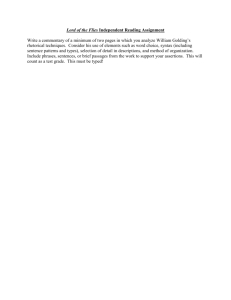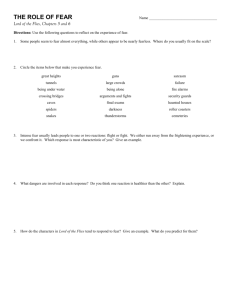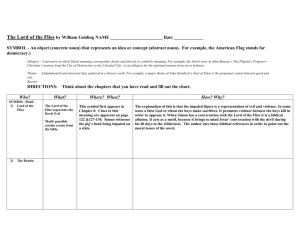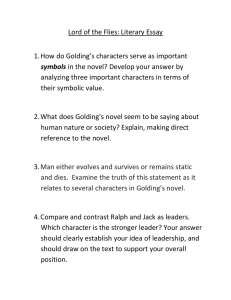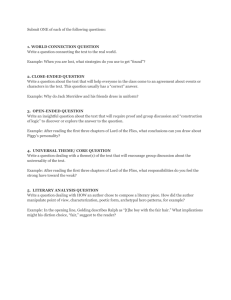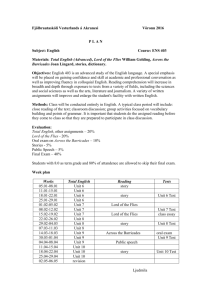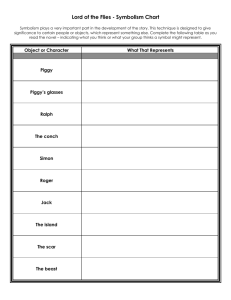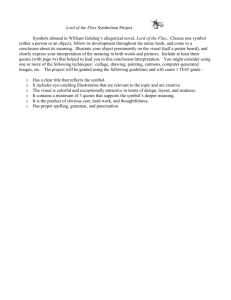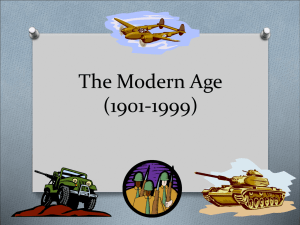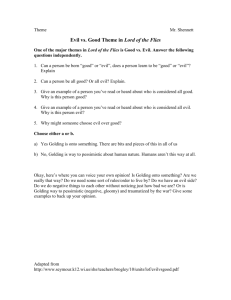3_Lord_of_the_Flies_files/Unit Overview
advertisement
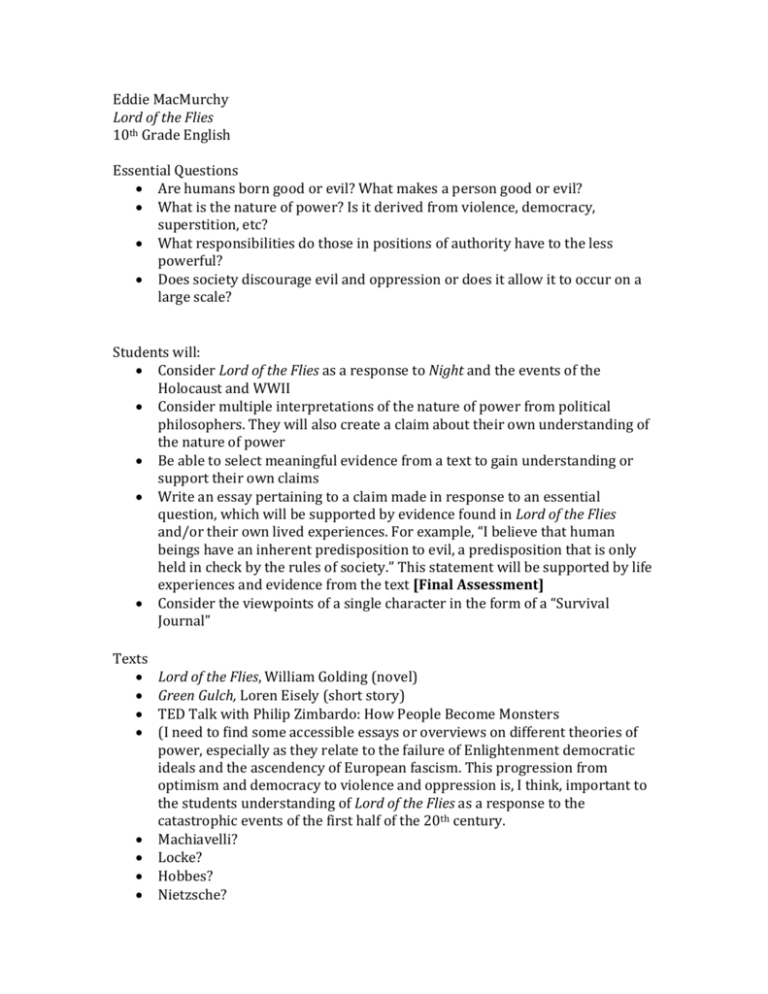
Eddie MacMurchy Lord of the Flies 10th Grade English Essential Questions Are humans born good or evil? What makes a person good or evil? What is the nature of power? Is it derived from violence, democracy, superstition, etc? What responsibilities do those in positions of authority have to the less powerful? Does society discourage evil and oppression or does it allow it to occur on a large scale? Students will: Consider Lord of the Flies as a response to Night and the events of the Holocaust and WWII Consider multiple interpretations of the nature of power from political philosophers. They will also create a claim about their own understanding of the nature of power Be able to select meaningful evidence from a text to gain understanding or support their own claims Write an essay pertaining to a claim made in response to an essential question, which will be supported by evidence found in Lord of the Flies and/or their own lived experiences. For example, “I believe that human beings have an inherent predisposition to evil, a predisposition that is only held in check by the rules of society.” This statement will be supported by life experiences and evidence from the text [Final Assessment] Consider the viewpoints of a single character in the form of a “Survival Journal” Texts Lord of the Flies, William Golding (novel) Green Gulch, Loren Eisely (short story) TED Talk with Philip Zimbardo: How People Become Monsters (I need to find some accessible essays or overviews on different theories of power, especially as they relate to the failure of Enlightenment democratic ideals and the ascendency of European fascism. This progression from optimism and democracy to violence and oppression is, I think, important to the students understanding of Lord of the Flies as a response to the catastrophic events of the first half of the 20th century. Machiavelli? Locke? Hobbes? Nietzsche? Rousseau? Kohlberg Spiral of Silence Bystander Effect Freewrites What is necessary for survival? Do these needs change if survival means that of a group rather than an individual? Based on your own experiences, do you believe that human beings are inherently good or inherently evil? Why or why not? Is an eight-year-old capable of committing evil? At what age do we become responsible for our actions? What is the power of a mask? Does a mask hide our true form or allow our true form to show through? In Jung’s terms, does the mask allow the shadow to overpower the persona? Does society corrupt us and make/enable evil, or do the rules of society keep our eviler impulses in check? “If only there were evil people somewhere insidiously committing evil deeds, and it were necessary only to separate them from the rest of us and destroy them. But the line dividing good and evil cuts through the heart of every human being. And who is willing to destroy a piece of his own heart?” What does this quote from Russian writer Alexander Solzhenitsyn mean in the context of Lord of the Flies? What does it mean in the context of your own life? Developing Ideas: Tracing Students will be given the essential questions on the first day of the unit. They will have the opportunity to read them, ask questions, and then formulate a response (claim) to essential question in writing. This should be supported by evidence, either from their own lives or from stories they have heard, seen, or read (in my opinion, these are valid examples of life experiences). Through written responses from their peers, the students should leave the first day of class with a well-developed claim. Throughout the course of the unit, students will use evidence from Lord of the Flies and other texts to develop a deeper understanding of their claim. This evidence can either affirm or question the original claim. By the end of the unit, students will have a well developed claim and a notebook of data with which they can write an essay describing their answer to the original essential question using claim, data, and warrant. Key Quotes After completing assigned chapters for LotF, students will be asked to review their initial claim and identify a passage of text that either affirms or questions their claim. This data should be recorded in a journal (maybe I should make sheets?) with page numbers included. The data should be accompanied by an analysis and explanation of significance in relation to the claim (warrant). Character Journals After completing the assigned reading for Lord of the Flies, you have met Ralph, Jack, Simon, and Piggy. Choose one of these characters and write a journal entry from that character’s perspective. Use 1st person. Here are some questions or ideas to consider: o How is your character feeling (worried, confident, powerful, weak, hungry, tired, angry, etc.)? It could be a combination of seemingly opposite ideas. o What other characters does your character agree with? Who does he disagree with? Who or what does he respect? o What is your character thinking or worrying about when he is falling asleep? Your journal entry should be at least 250 words. Other Assignments Seeing the Island: Using Golding’s narrative to draw a map of the island Wearing the Mask: Creating a mask for one character that incorporates symbols associated with that character. The mask will be accompanied by a written reflection on why the symbols are appropriate Key Quotes: Selecting meaningful passages of text Claim, Data, Warrant: Exploring the argumentative process Found Poem from student writing Small group and whole class discussions
